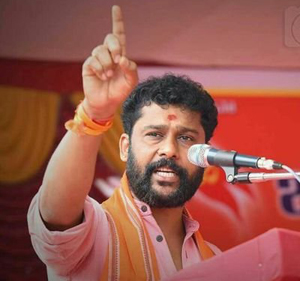Mangaluru, Jul 10: Dakshina Kannada district police has slapped criminal cases against five local leaders of Hindutva groups for their alleged role in triggering unrest in Bantwal taluk during the funeral procession of murdered RSS activist Sharath Madivala.
The accused include Satyajit Surathkal, State Secretary, Bharatiya Janata Party Backward Classes Morcha, and Sharan Pumpwell, State Convenor of Bajrang Dal. The other accused are Pradeep Pumpwell, Muralikrishna Hasanthadka and Harish Poonja.
Cases have been registered at jurisdictional Bantwal Town Police Station against the above five under Section 307 of the Indian Penal Code. Police are likely to arrest the five accused soon.
Sharath Madivala, a 28-year-old RSS activist was stabbed by unidentified miscreants in BC Road on July 4. He breathed his last at a hospital in Mangaluru on July 7.
On July 8 Sangh Parivar activists took the mortal remains of Sharath to his home town Sajipa Munnir in Bantwal taluk through a procession ignoring prohibitory orders. When the procession reached Bantwal, miscreants pelted stones at shops and vehicles.
It is worth mentioning here that several suspected Hindutva activists were caught on camera collecting stones on road during the procession.
Also Read: Cops raid BJP leader’s house over stone pelting during RSS activist’s funeral




Comments
Bharat Maathaa
Burma Chachee
Nepal Chachoo
Bangladesh Padosiki Maa
Pakistan Dushman ki Maa
China Chath mai rehnewale ke maa
Sri lanka Samandar mai rehnewale ka Maa..
Asli Maa Footpath mai...
False news.. nobody arrested rss leaders till now.
Add new comment